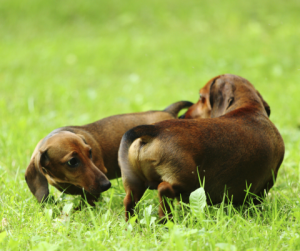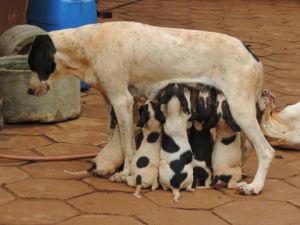Deciding whether or not to breed from a pet can be really hard; and it’s very easy to talk yourself into doing something that you later regret…! So in this blog, we’ll look at some of the things you have to consider when breeding from a pet bitch… 
Are her genes good enough to preserve?
Just because a dog is a fantastic pet, with a great character and temperament, it doesn’t necessarily follow that she’s good breeding material. Remember too, that there are thousands of homeless dogs in rescue centres – you should have a good reason for adding to the numbers of dogs in the world.
Now, that doesn’t mean you shouldn’t breed from her – but you need to be certain that you’re adding something special to the canine gene pool. For example, it’s usually unwise to breed a crossbred dog, unless there’s something in particular you want to preserve – this is because you can have no idea how the puppies will turn out! I’ll also point out that, for the purposes of genetics, “breeds” like Jackpoos or Labradoodles are crossbreds – they cannot breed true. Pure-breed dogs have very limited genetic variability, meaning that the offspring are likely to be physically, as well as genetically, similar to the parents; this is not necessarily true of crossbreds, because of a genetic phenomenon known as masked recessive genes.
If your bitch has or has had any potentially heritable diseases (like an undershot jaw, entropion – turned in eyelids – or a cruciate ligament injury), then you don’t want to breed from her. You should also never breed a dog without a good hip – and elbow score; and you might also consider getting DNA tests done for other genetic conditions known in the breed – give us a ring and we’ll be able to advise you on what tests are available. Sadly there are too many dogs from substandard bloodlines being produced, especially when the breed is in fashion, resulting in serious health and welfare problems in future generations.
Is she medically a good candidate for breeding?
In other words, is she physiologically and medically fit to be mated and bear a litter? The first thing to consider is her age – as a rule of thumb, dogs start their seasons in their second year of life; however, this is really variable – especially between breeds, as giant breed dogs are much slower to reach maturity than small breeds are. Generally speaking, however, it is never wise to breed a bitch for the first time under 1 year of age and over 7. For most dogs, however, 2 years of age is the safe minimum. If you’re considering breeding a young or older bitch, give us a ring and we’ll be able to advise you.
The next question is whether she has any medical conditions that would make it difficult, or impossible, to bear a litter successfully. For this, you’ll need to bring her in – make an appointment to see one of our vets for a pre-breeding check. Conditions that may impair her breeding ability include pelvis injuries, hormone imbalances like Cushing’s Disease, and many more, so let us make sure she’s in tip-top condition!
Can you take care of her while pregnant and whelping?
Pregnancy itself is pretty easy for most bitches – however, whelping can be very hard on them. You need to know what danger signs to look out for, when to call us, and when it’s an emergency. You also need to budget for pregnancy scans and a contingency fund to cover a caesarean operation if whelping goes badly. 
Are you legally covered?
There is a specific law covering breeding bitches – the Breeding and Sale of Dogs (Welfare) Act 1999; this means that you need a license to breed from a bitch if you are producing 5 or more litters per year on the premises, or if the local authority suspects that you are breeding for commercial gain. If in doubt, contact your local Environmental Health Office for advice (strangely, they’re the people responsible for enforcing the Act!).
What will you do with the puppies?
A bitch may produce up to 12 (or even more!) puppies in a single litter (although this is rare). You need to be able to care for them, get them vaccinated and microchipped, and then find good loving homes for them all. Can you do that?
Will the benefits outweigh the potential costs?
Successfully breeding and rearing a litter of puppies is incredibly satisfying; however, it is also expensive and occasionally heartwrenching. You need to be ready for that – and don’t assume you’ll necessarily make the money back when you sell the puppies!
If you want to breed your bitch, give us a ring and we can talk you through all the details!
